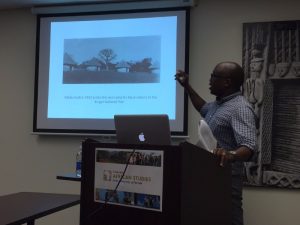Dr. Jacob Dlamini, gave a Baraza presentation last Friday, September 29 titled, “Safari Nation: A Transnational History of the Kruger National Park.” Dr. Dlamini is an assistant professor of history at Princeton University. He obtained his Ph.D. from Yale University in 2012 and is also a graduate of Wits University in South Africa and Sussex University in England. Dr. Dlamini held a postdoctoral fellowship at the University of Barcelona, Spain, from November 2011 to April 2015, and was a Visiting Scholar at Harvard University from August 2014 to May 2015. Dr. Dlamini comes from a background in journalism, which informs his work as an historian. His publications include: Askari: A Story of Collaboration and Betrayal in the Anti-apartheid Struggle (2014); “The Root of the Matter: Scenes from an ANC Branch.” African Studies (2010); and Native Nostalgia (2009).
Dr. Dlamini’s presentation focused on Kruger National Park in South Africa. He asked, if national parks are colonial creations, why do they still exist in post-colonial Africa? Every country in Africa has some form of protected area, but why? Often the answer to this question is centered on tourism, however Dr. Dlamini makes the point that many parks in Africa do not have enough tourists for this to be the only reason for their existence. Instead, he argues that we must think beyond tourism to identify why parks are still so prevalent throughout Africa. The lecture looks at the history of Kruger National Park to address this question.
Dr. Dlamini points to a historically complex and extensive relationship between Kruger National Park, Black Africans, and conservation. Although there is a misconception that Black South Africans could not enter Kruger National Park at one point, this is not true and minimizes the engagement Black South Africans have had with the park. Dr. Dlamini uses examples of black mountaineering groups, sport hunters, and others who appreciated the aesthetics of nature in the national park. The history of Black South Africans in parks has larger political significance as well. He argues that national parks had a role in the imaginative construction of the country’s identity. Through the park’s history we can see how South Africa became not a nationality, but a transnationality. Nature can also be perceived as a political resource, as ideas about access, rights, and entitlement were developed in these spaces, impacting how the state positioned itself on issues of environmental governance. He discussed the engagement of Black South Africans with national parks as an attempt to work against the narrative that they are subjects rather than citizens; that whoever can define nature for a nation decides that nation’s polity.
Dr. Dlamini argues that for too long the experiences of Black Africans have not been included in the histories of national parks. He believes there is something to be gained from conservation narratives that focus on possession rather than dispossession occurring in parks. By this he means that many conservation histories have focused on fortress conservation models, park evictions, and other processes of marginalization—but, neglecting narratives of possession results in a truncated history that does not contextualize the black experience. Dr. Dlamini’s lecture from this Baraza touches on some of the discussions that will be featured in his upcoming book.